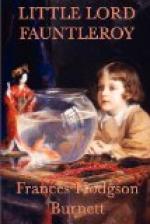But at last the carriage, having passed the gates and bowled through the green lanes for a short distance, stopped. They had reached Court Lodge; and Fauntleroy was out upon the ground almost before the big footman had time to open the carriage door.
The Earl wakened from his reverie with a start.
“What!” he said. “Are we here?”
“Yes,” said Fauntleroy. “Let me give you your stick. Just lean on me when you get out.”
“I am not going to get out,” replied his lordship brusquely.
“Not—not to see Dearest?” exclaimed Fauntleroy with astonished face.
“‘Dearest’ will excuse me,” said the Earl dryly. “Go to her and tell her that not even a new pony would keep you away.”
“She will be disappointed,” said Fauntleroy. “She will want to see you very much.”
“I am afraid not,” was the answer. “The carriage will call for you as we come back.—Tell Jeffries to drive on, Thomas.”
Thomas closed the carriage door; and, after a puzzled look, Fauntleroy ran up the drive. The Earl had the opportunity—as Mr. Havisham once had—of seeing a pair of handsome, strong little legs flash over the ground with astonishing rapidity. Evidently their owner had no intention of losing any time. The carriage rolled slowly away, but his lordship did not at once lean back; he still looked out. Through a space in the trees he could see the house door; it was wide open. The little figure dashed up the steps; another figure—a little figure, too, slender and young, in its black gown—ran to meet it. It seemed as if they flew together, as Fauntleroy leaped into his mother’s arms, hanging about her neck and covering her sweet young face with kisses.
VII
On the following Sunday morning, Mr. Mordaunt had a large congregation. Indeed, he could scarcely remember any Sunday on which the church had been so crowded. People appeared upon the scene who seldom did him the honor of coming to hear his sermons.
There were even people from Hazelton, which was the next parish. There were hearty, sunburned farmers, stout, comfortable, apple-cheeked wives in their best bonnets and most gorgeous shawls, and half a dozen children or so to each family. The doctor’s wife was there, with her four daughters. Mrs. Kimsey and Mr. Kimsey, who kept the druggist’s shop, and made pills, and did up powders for everybody within ten miles, sat in their pew; Mrs. Dibble in hers; Miss Smiff, the village dressmaker, and her friend Miss Perkins, the milliner, sat in theirs; the doctor’s young man was present, and the druggist’s apprentice; in fact, almost every family on the county side was represented, in one way or another.




